人教版高中英语必修4 Unit 3 A taste of English humour 语法精讲专项课件(共26张PPT)
文档属性
| 名称 | 人教版高中英语必修4 Unit 3 A taste of English humour 语法精讲专项课件(共26张PPT) | 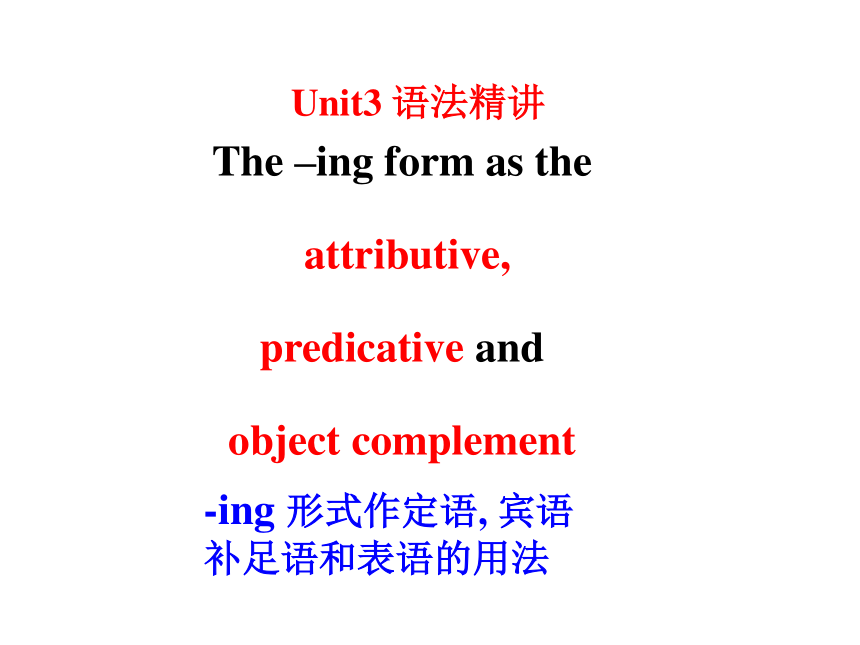 | |
| 格式 | zip | ||
| 文件大小 | 64.3KB | ||
| 资源类型 | 教案 | ||
| 版本资源 | 人教版(新课程标准) | ||
| 科目 | 英语 | ||
| 更新时间 | 2015-03-09 18:18:36 | ||
图片预览

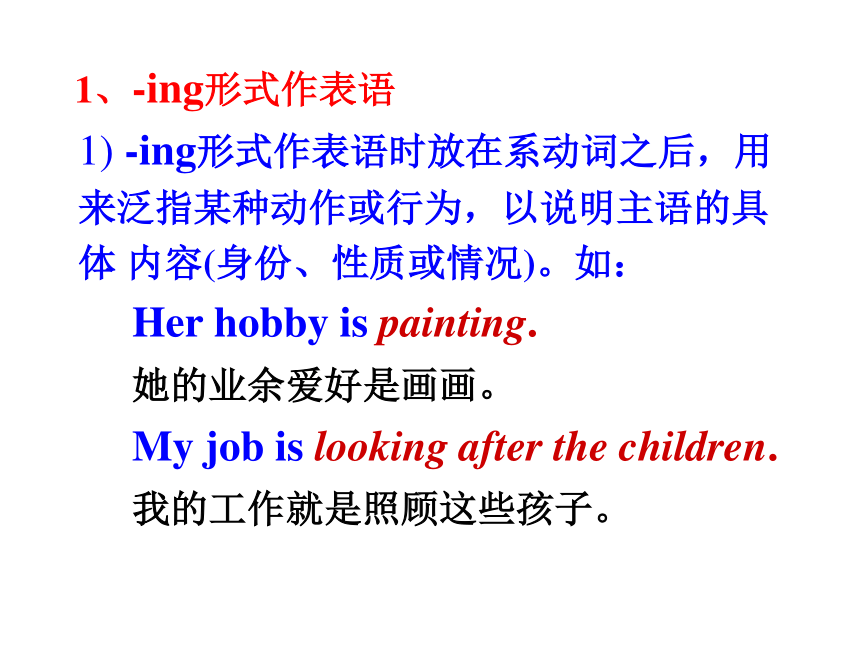
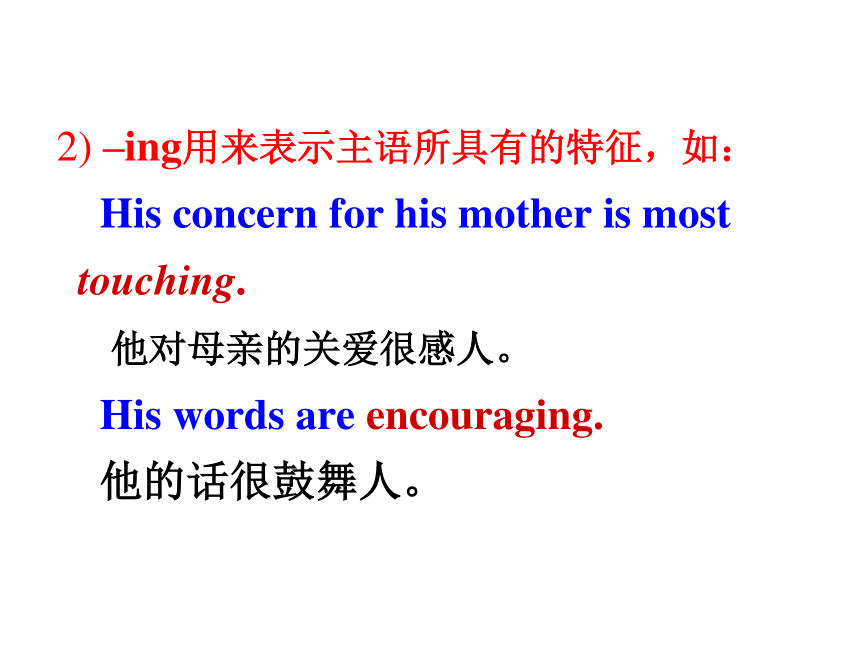
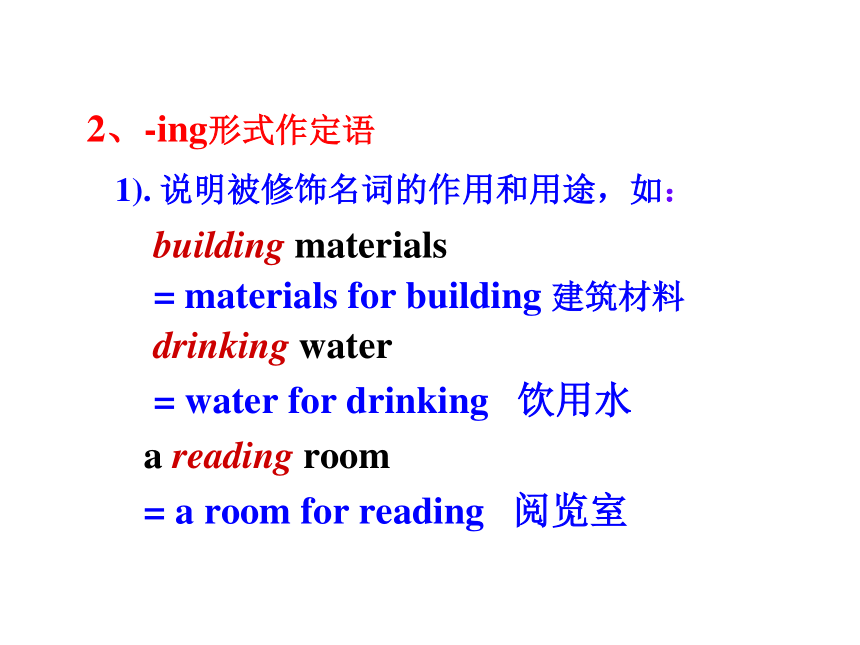
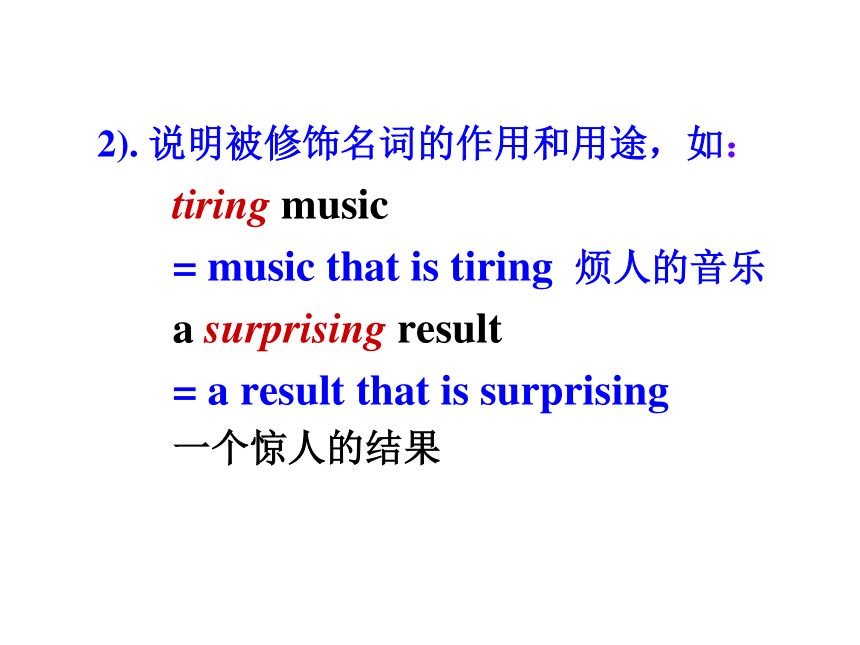
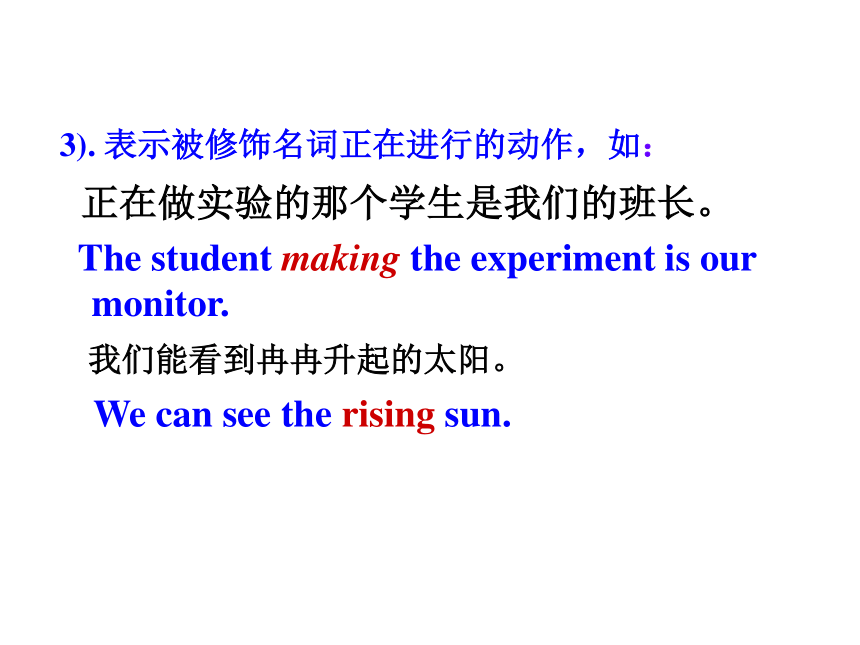
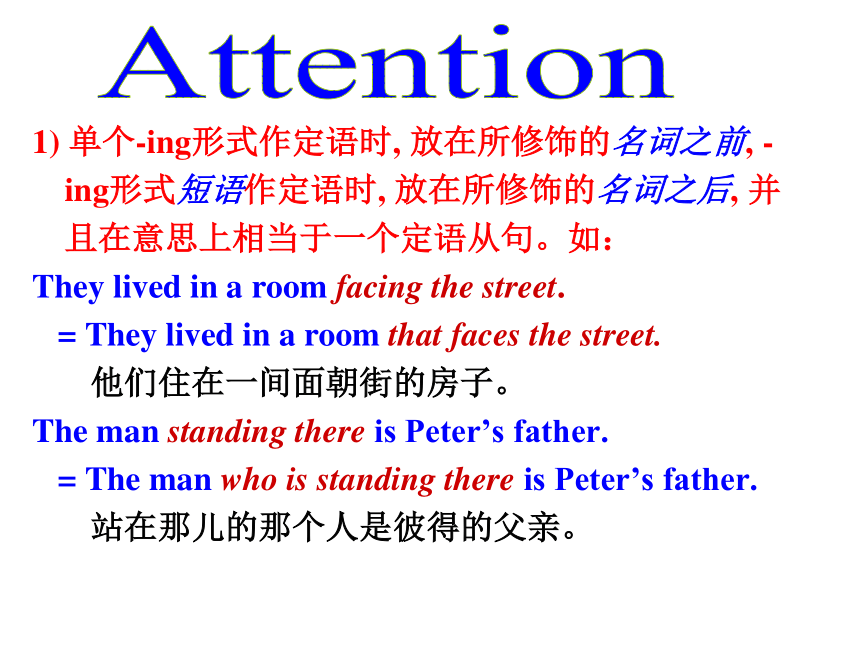
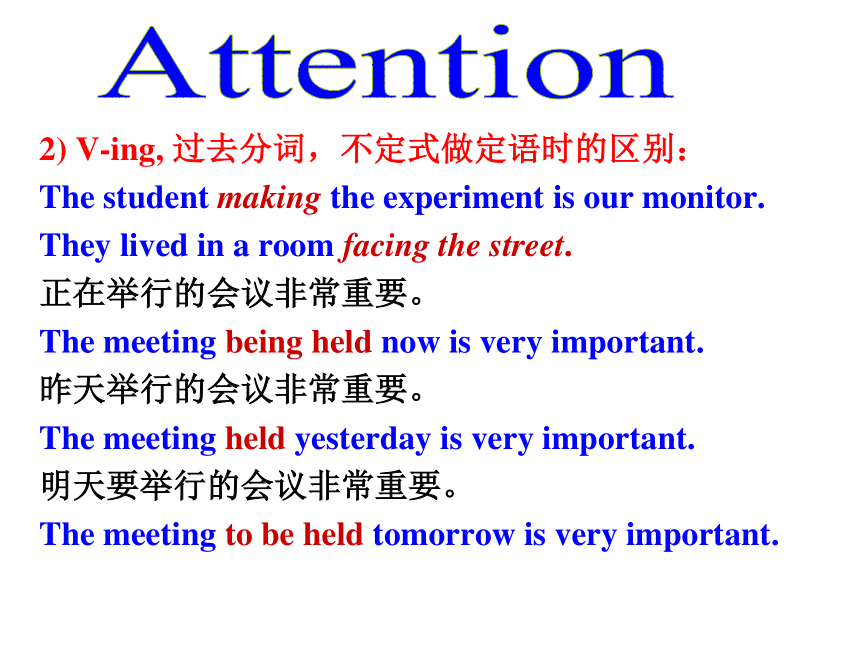
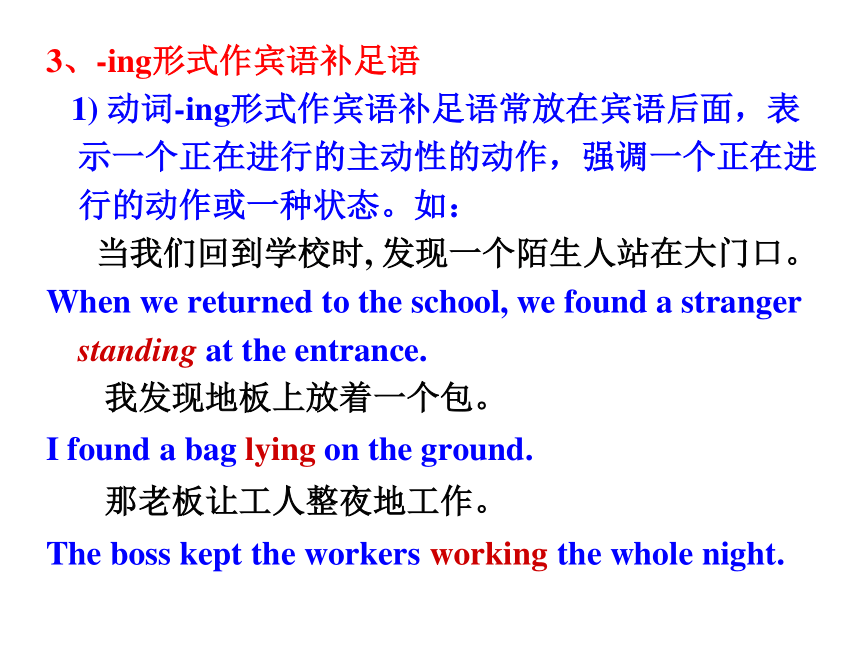
文档简介
课件26张PPT。-ing 形式作定语, 宾语补足语和表语的用法The –ing form as the
attributive,
predicative and
object complementUnit3 语法精讲 1、-ing形式作表语
1) -ing形式作表语时放在系动词之后,用来泛指某种动作或行为,以说明主语的具体 内容(身份、性质或情况)。如:
Her hobby is painting.
她的业余爱好是画画。
My job is looking after the children.
我的工作就是照顾这些孩子。 2) –ing用来表示主语所具有的特征,如:
His concern for his mother is most touching.
他对母亲的关爱很感人。
His words are encouraging.
他的话很鼓舞人。2、-ing形式作定语
1). 说明被修饰名词的作用和用途,如:
building materials
= materials for building 建筑材料
drinking water
= water for drinking 饮用水
a reading room
= a room for reading 阅览室
2). 说明被修饰名词的作用和用途,如:
tiring music
= music that is tiring 烦人的音乐
a surprising result
= a result that is surprising
一个惊人的结果
3). 表示被修饰名词正在进行的动作,如:
正在做实验的那个学生是我们的班长。
The student making the experiment is our monitor.
我们能看到冉冉升起的太阳。
We can see the rising sun.
1) 单个-ing形式作定语时, 放在所修饰的名词之前, -ing形式短语作定语时, 放在所修饰的名词之后, 并且在意思上相当于一个定语从句。如:
They lived in a room facing the street.
= They lived in a room that faces the street.
他们住在一间面朝街的房子。
The man standing there is Peter’s father.
= The man who is standing there is Peter’s father.
站在那儿的那个人是彼得的父亲。Attention2) V-ing, 过去分词,不定式做定语时的区别:
The student making the experiment is our monitor.
They lived in a room facing the street.
正在举行的会议非常重要。
The meeting being held now is very important.
昨天举行的会议非常重要。
The meeting held yesterday is very important.
明天要举行的会议非常重要。
The meeting to be held tomorrow is very important.Attention3、-ing形式作宾语补足语
1) 动词-ing形式作宾语补足语常放在宾语后面,表示一个正在进行的主动性的动作,强调一个正在进行的动作或一种状态。如:
当我们回到学校时, 发现一个陌生人站在大门口。
When we returned to the school, we found a stranger standing at the entrance.
我发现地板上放着一个包。
I found a bag lying on the ground.
那老板让工人整夜地工作。
The boss kept the workers working the whole night.
2)当主句转换为被动结构时, 原来作宾语补足语的动词-ing形式便转换为主语补足语。如:
They found the result very satisfying.
= The result is found very satisfying.
They heard him singing in the next room.
= He was heard singing in the next room. 3). 能用-ing形式作宾语补足语的几类动词:
a. 感官动词,常见的有see, hear, feel, smell, find, notice, observe, 等。如:
We saw a light burning in the window.
I felt somebody patting me on the shoulder.
Can you smell anything burning?
As he spoke, he observed everybody looking at him curiously.
Listen to the birds singing.
I didn’t notice him waiting.b. 使役动词,常见的有have, set, keep, get, catch, leave等。如:
I won’t have you doing that.
This set me thinking.
I’m sorry to have kept you waiting.
I can’t get the clock going again.
You won’t catch me doing that again.1. The ______ boy was last seen ______ near the bank of the lake.
missing; playing B. missing; play
C. missed; played D. missed; to play
解析:missing是形容词,作boy的定语,意思是“失踪的”。 was last seen playing表示被看见时正在玩。高考链接2. Mr Smith, ______ of the ______ speech, started to read a novel.
tired; boring B. tiring; bored
C. tired; bored D. tiring; boring
解析:此题考查现在分词与过去分词的区别。tired, moved, interested excited等过去分词叙述的是人的本身感受;tiring, moving, interesting, exciting等现在分词叙述的是某一物或事情给予人的感受。句意为“史密斯先生对这个令人厌烦的讲话感受厌倦了,所以开始读起一本小说来”。 Please read the sentences carefully, trying to pick out the errors and then correct them.
1. I am looking forward to visit Charlie Chaplin Museum in Switzerland next week. visiting 2. Many people still enjoy seeing Charlie Chaplin’s silent films.
3. That cartoon picture shows Charlie Chaplin watch himself watching a movie.
4. Charlie’s nonverbal humor often makes people bursting with laughter. √watchingburst 5. We are all fond of Charlie’s early films, which we think are more interested.
6. I missed to see the beginning of the film City Lights the other day.
7. I wouldn’t mind to see The Gold Rush again with you tonight.
8. Charlie’s job was entertain people, wasn’t he?interestingseeingseeingentertaining 从 A、B、C、D 四个选项中,选出可以填入空白处的最佳选项。 1. Don’t leave the water _______ while you brush your teeth.
A. run B. running
C. being run D. to run 2. John’s bad habit is _____ without thorough understanding.
? A. read B. being read
C. to be read D. reading 3. Tell Mary that there’s someone ____ for her at the door.
A. waiting B. waited
C. waits D. to wait4. The _______ waiter came up to us and said, “You are welcome.”
A. smiling B. smiled
C. smile D. to smile 5. A phone call sent him _______ to the hospital.
A. hurry B. hurrying
C. to hurry D. hurried6. Do you know the boy _______ under the big tree?
A. lay B. lain
C. laying D. lying 7. I can hardly imagine Peter _______ across the Atlantic Ocean in five days.
A. sail B. to sail
C. sailing D. to have sailed 8. There are lots of places of interest _______ in our city.
? A. needs repairing
B. needing repaired
? C. needed repairing
D. needing to be repaired 9. The drunken husband knocked against the table and sent the bowls _______ in all directions before he was sent _______ by his wife.
? A. flying; to sleep
B. flying; sleeping
C. to fly; to sleeping
D. to fly; to sleep 10. When we got back from the cinema, we found the lamp _______ but the door _______.
A. being on; shut
B. burning; shutting
C. burning; shut
D. on; shutting 11. As is known to us all, traveling is _____, but we often feel _____ when we are back from travels.
? A. interesting; tired
B. interested; tiring
C. interesting; tiring
D. interested; tired 12. The woman found it no good _____ her daughter too much money.
A. giving B. being given
C. given D. gave13. As the stone was too heavy to move, I left it _____on the ground.
? A. laying B. lay
C. lying D. lain
attributive,
predicative and
object complementUnit3 语法精讲 1、-ing形式作表语
1) -ing形式作表语时放在系动词之后,用来泛指某种动作或行为,以说明主语的具体 内容(身份、性质或情况)。如:
Her hobby is painting.
她的业余爱好是画画。
My job is looking after the children.
我的工作就是照顾这些孩子。 2) –ing用来表示主语所具有的特征,如:
His concern for his mother is most touching.
他对母亲的关爱很感人。
His words are encouraging.
他的话很鼓舞人。2、-ing形式作定语
1). 说明被修饰名词的作用和用途,如:
building materials
= materials for building 建筑材料
drinking water
= water for drinking 饮用水
a reading room
= a room for reading 阅览室
2). 说明被修饰名词的作用和用途,如:
tiring music
= music that is tiring 烦人的音乐
a surprising result
= a result that is surprising
一个惊人的结果
3). 表示被修饰名词正在进行的动作,如:
正在做实验的那个学生是我们的班长。
The student making the experiment is our monitor.
我们能看到冉冉升起的太阳。
We can see the rising sun.
1) 单个-ing形式作定语时, 放在所修饰的名词之前, -ing形式短语作定语时, 放在所修饰的名词之后, 并且在意思上相当于一个定语从句。如:
They lived in a room facing the street.
= They lived in a room that faces the street.
他们住在一间面朝街的房子。
The man standing there is Peter’s father.
= The man who is standing there is Peter’s father.
站在那儿的那个人是彼得的父亲。Attention2) V-ing, 过去分词,不定式做定语时的区别:
The student making the experiment is our monitor.
They lived in a room facing the street.
正在举行的会议非常重要。
The meeting being held now is very important.
昨天举行的会议非常重要。
The meeting held yesterday is very important.
明天要举行的会议非常重要。
The meeting to be held tomorrow is very important.Attention3、-ing形式作宾语补足语
1) 动词-ing形式作宾语补足语常放在宾语后面,表示一个正在进行的主动性的动作,强调一个正在进行的动作或一种状态。如:
当我们回到学校时, 发现一个陌生人站在大门口。
When we returned to the school, we found a stranger standing at the entrance.
我发现地板上放着一个包。
I found a bag lying on the ground.
那老板让工人整夜地工作。
The boss kept the workers working the whole night.
2)当主句转换为被动结构时, 原来作宾语补足语的动词-ing形式便转换为主语补足语。如:
They found the result very satisfying.
= The result is found very satisfying.
They heard him singing in the next room.
= He was heard singing in the next room. 3). 能用-ing形式作宾语补足语的几类动词:
a. 感官动词,常见的有see, hear, feel, smell, find, notice, observe, 等。如:
We saw a light burning in the window.
I felt somebody patting me on the shoulder.
Can you smell anything burning?
As he spoke, he observed everybody looking at him curiously.
Listen to the birds singing.
I didn’t notice him waiting.b. 使役动词,常见的有have, set, keep, get, catch, leave等。如:
I won’t have you doing that.
This set me thinking.
I’m sorry to have kept you waiting.
I can’t get the clock going again.
You won’t catch me doing that again.1. The ______ boy was last seen ______ near the bank of the lake.
missing; playing B. missing; play
C. missed; played D. missed; to play
解析:missing是形容词,作boy的定语,意思是“失踪的”。 was last seen playing表示被看见时正在玩。高考链接2. Mr Smith, ______ of the ______ speech, started to read a novel.
tired; boring B. tiring; bored
C. tired; bored D. tiring; boring
解析:此题考查现在分词与过去分词的区别。tired, moved, interested excited等过去分词叙述的是人的本身感受;tiring, moving, interesting, exciting等现在分词叙述的是某一物或事情给予人的感受。句意为“史密斯先生对这个令人厌烦的讲话感受厌倦了,所以开始读起一本小说来”。 Please read the sentences carefully, trying to pick out the errors and then correct them.
1. I am looking forward to visit Charlie Chaplin Museum in Switzerland next week. visiting 2. Many people still enjoy seeing Charlie Chaplin’s silent films.
3. That cartoon picture shows Charlie Chaplin watch himself watching a movie.
4. Charlie’s nonverbal humor often makes people bursting with laughter. √watchingburst 5. We are all fond of Charlie’s early films, which we think are more interested.
6. I missed to see the beginning of the film City Lights the other day.
7. I wouldn’t mind to see The Gold Rush again with you tonight.
8. Charlie’s job was entertain people, wasn’t he?interestingseeingseeingentertaining 从 A、B、C、D 四个选项中,选出可以填入空白处的最佳选项。 1. Don’t leave the water _______ while you brush your teeth.
A. run B. running
C. being run D. to run 2. John’s bad habit is _____ without thorough understanding.
? A. read B. being read
C. to be read D. reading 3. Tell Mary that there’s someone ____ for her at the door.
A. waiting B. waited
C. waits D. to wait4. The _______ waiter came up to us and said, “You are welcome.”
A. smiling B. smiled
C. smile D. to smile 5. A phone call sent him _______ to the hospital.
A. hurry B. hurrying
C. to hurry D. hurried6. Do you know the boy _______ under the big tree?
A. lay B. lain
C. laying D. lying 7. I can hardly imagine Peter _______ across the Atlantic Ocean in five days.
A. sail B. to sail
C. sailing D. to have sailed 8. There are lots of places of interest _______ in our city.
? A. needs repairing
B. needing repaired
? C. needed repairing
D. needing to be repaired 9. The drunken husband knocked against the table and sent the bowls _______ in all directions before he was sent _______ by his wife.
? A. flying; to sleep
B. flying; sleeping
C. to fly; to sleeping
D. to fly; to sleep 10. When we got back from the cinema, we found the lamp _______ but the door _______.
A. being on; shut
B. burning; shutting
C. burning; shut
D. on; shutting 11. As is known to us all, traveling is _____, but we often feel _____ when we are back from travels.
? A. interesting; tired
B. interested; tiring
C. interesting; tiring
D. interested; tired 12. The woman found it no good _____ her daughter too much money.
A. giving B. being given
C. given D. gave13. As the stone was too heavy to move, I left it _____on the ground.
? A. laying B. lay
C. lying D. lain
同课章节目录
